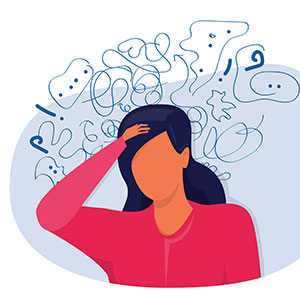
ADHD
What is it and what are Usask supports
By Student Wellness CentreAttention Deficit Hyperactivity Disorder
Everybody can have difficulty sitting still, paying attention, or controlling impulsive behavior occasionally. For some people, however, the problems are so pervasive and persistent that they interfere with all aspects of their life: Home, academic, social, and work. Individuals with ADHD can be very successful in life. However, without identification and proper treatment, ADHD may have debilitating consequences.
ADHD is a chronic neurological condition and requires long-term planning. It needs to include regular visits with your family physician to discuss progress and performance. Treatment is usually multi-modal which means you may require medicine, counselling, and other supports and treatments.
A Multidimensional Disorder
Inattention and hyperactivity affect all parts of life, not just academics. People with ADHD are at a higher risk for car accidents, unplanned pregnancy, sexually transmitted diseases, anxiety, depression, eating disorders, and drug/alcohol abuse.
ADHD Prevalence
Approximately 4.7% of the population has ADHD.
2.5% is hyperactivity and inattention, combined.
0.9% is hyperactivity alone.
1.3% is inattention alone.
7.3 % of USask students report having ADHD
5 Principles of Holistic Based Care
- Education
The more educated you and those close to you are, the better you’ll understand your treatment options, and be able to find the option that works best for you. Your sources for more information at USask include the staff at the Student Wellness Centre and the staff at Access and Equity Services. Both services will provide further sources of information as you require it.
- Behavioural interventions
The core reason for intervention is to help you develop coping strategies for success, academic or otherwise. As you become more familiar with your condition you will learn new strategies to integrate different habits into your life. Be patient. Stay optimistic. Better results will occur when you and your health team are working together.
- Psychological treatment
Self-esteem and interpersonal conflict tend to be major concerns to those affected with ADHD. Don’t be surprised if your family physician suggests Cognitive Behavioral Therapy (CBT) amongst other treatment options. CBT has been demonstrated to be quite useful in reducing anxiety.
- Academic accommodations
ADHD is classified as a developmental neuropsychiatric disorder. Any student with ADHD has the right to ask for and receive academic accommodations. Access and Equity Services will assist you in accessing the services that you require to be successful in your course of studies.
- Medication management
No one medication is suitable for every student who has ADHD. The guiding principle of medication management is to start low and go slow. Again, be patient and keep regular appointments with your family physician.
Helping Yourself
- Meet with Access and Equity Services to learn about student accommodations, including exams,
- Once registered make sure to handout your Letter to Professors (LTP) every term
- Meet with Student Wellness Centre to explore treatment options including medication,
- Visit Student Learning Hub in Murray Library for help with writing and math skills,
- Aim to get at least 150 minutes of physical activity weekly,
- Aim for 6-8 hours of sleep every night,
- Keep your diet as healthy as you can. Aim for 6-7 servings of vegetables and fruit daily,
- Attend in-person class as much as possible. Meet with your professors to clarify concepts and review tests and assignments,
- Set a structured schedule with SMART goals (Specific, Measurable, Attainable, Realistic, Time-based) and scheduled breaks, and
- Take time to relax with healthy hobbies such as playing on sports teams, taking walks, and listening to music.
An ADHD Study Environment
Some recommendations for a good learning environment include: establish a stimuli free area at home and find a quiet area at school so you have multiple quiet places to study, make a to-do list, and use a timer to stay on task.
Resources on Campus, in the community and Online
Campus:
- Student Wellness Centre
- Access and Equity, Access and Equity Services is available to assist students with temporary or permanent disabilities and is committed to helping students become strong, self-directed, accountable, proactive, and academically successful. Please register with AES as soon as possible so that you can work together to meet your needs.
On-line
Community:
- LDAS: 306 652-4114
- ADHD Coaching:
- LDAS: ldas.org
- ADHD Lectures by Dr. Russel Barkley: Youtube.com
- Centre for ADHD Awareness, Canada caddac.ca
- help4adhd.org
- additudemag.com
Books:
- Taking Charge of Adult ADHD, Russel Barkley
- Smart but Scattered, Guide to Success, Peg Dawson & Richard Guare
- Driven to Distraction (Revised): Recognizing and Coping with Attention Deficit Disorder, Edward Hallowell and John Ratey
- Gabor Maté Scattered Minds
- Kathleen G. Nadeau PH.D. The Survival Guide for College Students with ADHD or LD 2nd Edition, Magination Press
- Edward W. Hallowell & John J. Ratey, Driven to Distraction,
- More Attention, Less Deficit: Success Strategies for Adults with ADHD, Ari Tuckman.
- My Brain Still Needs Glasses, Annick Vincent.
- The Disorganized Mind: Coaching Your ADHD Brain to Take Control of Your Time, Tasks, and Talents, Nancy A. Ratey.

